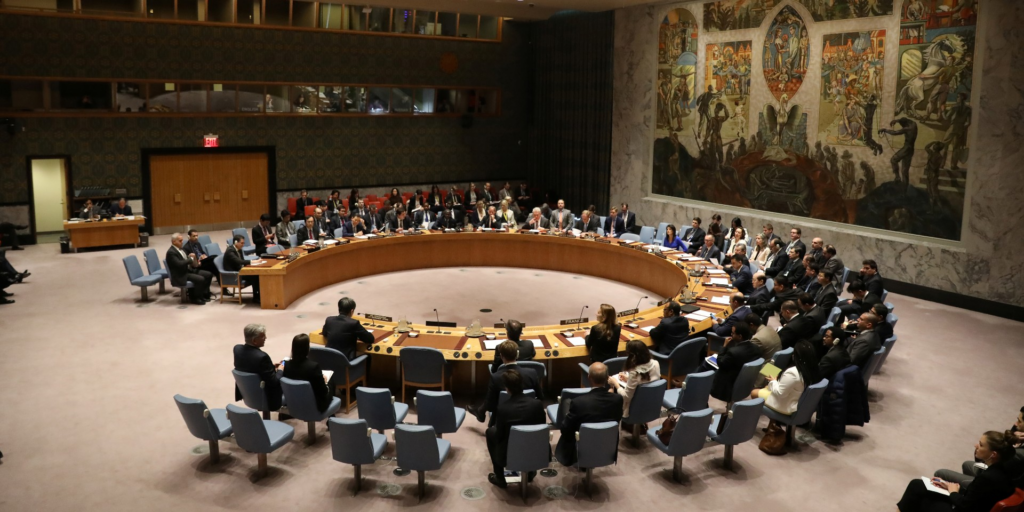Global security has become an increasingly important issue in today’s interconnected world. In simple terms, global security refers to the measures taken to safeguard nations, people, and the international community from threats that can lead to harm, conflict, or instability.
Table of Contents
The Importance of Global Security
Global security affects all aspects of our daily lives, from our personal safety to economic stability. It protects us from threats such as terrorism, cybercrime, nuclear weapons, natural disasters, and even pandemics. Furthermore, global security is about fostering peace, stability, and cooperation between countries.
In today’s complex environment, global security is more crucial than ever. The rise of terrorism, the proliferation of weapons of mass destruction, and the increasing frequency of natural disasters pose significant challenges. Recent events such as the COVID-19 pandemic have demonstrated how impacts on global health, with economic implications that ripple throughout the world. The relationship between Global Health, Determinants of Health and Security cannot be overstated.
Experts agree that international cooperation is necessary to address these challenges. The UN Security Council provides a framework for addressing global security threats and ensuring that all nations work together for this common goal.
Defining Global Security
The meaning of global security encompasses many different aspects. It includes efforts to prevent war, resolve conflicts peacefully, and promote disarmament. There are also efforts to address economic and environmental factors that can contribute to global insecurity. Additionally, maintaining cybersecurity and ensuring that critical infrastructure remains secure is an increasingly important part of Global Security efforts.
The concept of global security is about creating a world in which people can live safely, free from fear and insecurity. As a global community, we must continue to work together to safeguard our planet from destruction and promote peace, stability, and cooperation between nations. Global Security is needed to help us better understand how we can ensure safety for ourselves and for all.
Global Security Issues: Understanding the Major Threats
In today’s interconnected world, global security faces numerous challenges that threaten the stability, peace, and well-being of nations and individuals. Understanding these major threats is crucial in addressing and mitigating their impacts. Let’s delve into some of the significant global security issues faced by the international community.
- Terrorism: A Persistent Threat
Terrorism remains one of the most significant global security concerns. Acts of terrorism can cause extensive damage, loss of life, and social upheaval. Terrorist organizations aim to instill fear and disrupt societal harmony through violence and intimidation. The reach of terrorism has become even more globalized with the rise of extremist ideologies and the increasing use of online platforms for recruitment and propaganda.
- Cybercrime: A Technological Warfare
The digital age has brought forth a new frontier for security threats in the form of cybercrime. Hackers, organized crime syndicates, and state-sponsored groups target individuals, businesses, and governments with cyberattacks. These attacks can result in financial losses, theft of personal information, and disruption of critical infrastructure. The rapid advancement of technology poses an ongoing challenge in staying one step ahead of cyber threats.
- War and Armed Conflicts: Endangering Peace
War and armed conflicts not only cause immense human suffering but also have far-reaching consequences for global security. Conflicts between nations, civil wars, and internal unrest destabilize regions, creating refugee crises and fueling tensions between countries. Armed conflicts often have complex geopolitical dynamics, making resolution and peacebuilding efforts challenging.
- Environmental Issues: Threats to Sustainable Future
The environment plays a crucial role in global security as climate change, deforestation, and the depletion of natural resources pose significant threats. Extreme weather events, rising sea levels, and the loss of biodiversity have widespread consequences, including displacement of populations, resource conflicts, and increased vulnerability to natural disasters. Ensuring environmental sustainability is essential in maintaining long-term global security.
Addressing the Global Security Threats
Effectively addressing these threats requires a comprehensive and collaborative approach:
- International Cooperation: Global security challenges transcend national borders and require cooperative efforts among nations. Institutions like the United Nations, NATO, and regional organizations play a vital role in promoting dialogue, peacekeeping, and conflict resolution.
- Enhanced Intelligence and Information Sharing: Sharing intelligence and information among nations is crucial to combating terrorism and cybercrime. Collaborative efforts in data exchange, analysis, and joint operations enable a more comprehensive response to these threats.
- Invest in Technology and Innovation: Ongoing investment in technology and innovation is necessary to stay ahead of evolving threats. Improved cybersecurity measures, advanced surveillance systems, and innovative solutions to environmental issues can contribute to enhancing global security.
- Address Root Causes: Tackling the root causes of global security threats is vital. This includes addressing socio-economic disparities, political instability, and social grievances that can fuel extremism and armed conflicts.
Global security faces a multitude of challenges, from terrorism and cybercrime to war and environmental issues. Understanding these threats and adopting a comprehensive approach is crucial in maintaining peace, stability, and well-being worldwide. By forging strong international partnerships and taking proactive measures, we can collectively work towards mitigating these threats and creating a safer and more secure world for everyone.
Diplomacy and Global Security: The Role of International Organizations

In the realm of global security, international organizations play a pivotal role in fostering cooperation, peace, and stability among nations. The United Nations (UN), North Atlantic Treaty Organization (NATO), and other global security organizations have become crucial actors in addressing security challenges on a global scale. Let’s explore the role of these organizations and how they contribute to global security.
United Nations: Advancing Collective Security
The United Nations is an intergovernmental organization founded in 1945 with the primary objective of maintaining international peace and security. The UN Security Council, composed of five permanent members (China, France, Russia, the United Kingdom, and the United States) and ten rotating non-permanent members, has the authority to authorize peacekeeping missions, impose sanctions, and authorize military interventions when necessary to restore peace.
Through its various agencies, programs, and peacekeeping missions, the UN addresses a wide range of global security issues, including conflicts, terrorism, human rights violations, and humanitarian crises. The UN promotes diplomatic negotiations, mediation, and dialogue to prevent and resolve disputes and encourages nations to abide by international law and uphold human rights.
North Atlantic Treaty Organization (NATO): Collective Defense and Cooperation
NATO is an intergovernmental military alliance established in 1949 to foster collective defense, cooperation in crisis management, and promote democratic values among its member states. The organization consists of 30 member countries from North America and Europe who engage in security consultations, joint military exercises, and cooperative initiatives.
NATO’s core mission is to ensure the security of its member states through a collective defense commitment outlined in Article 5 of the NATO Treaty. In this article, it is stated that an attack on one member nation is considered an attack on all, and the alliance will respond collectively. This principle has been key in deterring aggression and contributing to regional stability in Europe.
Other Global Security Organizations: Forge Cooperation and Partnerships
In addition to the UN and NATO, numerous other global security organizations contribute to addressing security challenges:
- International Criminal Court (ICC): The ICC investigates and prosecutes individuals responsible for war crimes, crimes against humanity, and genocide, holding them accountable for their actions.
- Organization for Security and Cooperation in Europe (OSCE): The OSCE works to prevent conflicts, promote democracy, and uphold human rights across the Eurasian region, engaging in various activities such as election monitoring, conflict mediation, and arms control.
- World Health Organization (WHO): While primarily focused on global health, the WHO plays a crucial role in addressing health-related security issues, such as pandemics and global health emergencies.
The Importance of International Organizations in Global Security
International organizations serve as platforms for dialogue, negotiation, and multilateral diplomacy, providing opportunities for nations to come together and address security challenges collectively. They promote peaceful resolutions, mediate disputes, and facilitate cooperation in a diverse range of areas.
These organizations facilitate information sharing, provide technical expertise and capacity-building support, and facilitate the coordination of joint efforts in combating global security threats. They also serve as forums for diplomatic engagement, allowing countries to voice concerns, build relationships, and foster trust.
Diplomacy and international organizations are instrumental in maintaining global security. The United Nations, NATO, and other global security organizations play vital roles in preventing conflicts, resolving disputes, and mitigating security threats. Through their work, these organizations contribute to the promotion of peace, stability, and cooperation among nations, fostering an environment conducive to global security in an increasingly interconnected world.
Solutions to Global Security: Building a Safer World

In an increasingly interconnected world, ensuring global security has become an urgent priority. Security challenges such as terrorism, cybercrime, and armed conflicts require proactive and innovative solutions. Let’s explore some key approaches to addressing these issues and building a safer world.
- Global Security Awareness: Empowering Individuals
Raising global security awareness is crucial in building a safer world. Individuals can play a significant role in identifying and reporting suspicious activities, contributing to early detection and prevention of security threats. Governments, international organizations, and civil society should invest in public campaigns and educational programs to enhance understanding of global security challenges and promote a culture of vigilance and resilience.
- Leveraging Technology for Global Security
Technology serves as a double-edged sword when it comes to global security. While it can facilitate criminal activities, innovative use of technology can also strengthen security efforts. Some examples include:
- Cybersecurity: Strengthening digital defenses through the use of advanced encryption, threat intelligence, and artificial intelligence can help prevent cyberattacks and protect sensitive data.
- Surveillance and Intelligence Gathering: Utilizing advanced surveillance technologies, including facial recognition, satellite imagery, and data analytics, can assist in detecting and tracking potential threats, enhancing security measures, and supporting law enforcement agencies.
- Communication and Collaboration: Embracing secure and encrypted communication channels can enable effective information sharing and coordination among security agencies, enhancing their ability to respond to security threats swiftly.
- Education: A Foundation for Global Security
Education plays a critical role in building a sustainable foundation for global security. By integrating global security topics into school curricula and educational programs, individuals can better understand the causes and consequences of security threats. Education empowers individuals to critically analyze and respond to complex security challenges, fostering a peaceful and inclusive society.
- International Cooperation: Collaboration is Key
Addressing global security challenges requires strong international cooperation. Governments, international organizations, and civil society must work together to exchange information, share best practices, and coordinate efforts. Collaboration can involve joint military operations, intelligence sharing, cross-border law enforcement, and diplomatic initiatives aimed at preventing conflicts and promoting peaceful resolutions.
- Conflict Prevention and Resolution: Sustainable Peace
Addressing the root causes of conflicts and addressing grievances is fundamental to achieving global security. Diplomatic negotiations, mediation, and peacebuilding efforts are essential in resolving conflicts and preventing their reemergence. Investing in conflict prevention strategies, supporting peace agreements, and providing humanitarian aid can contribute to sustainable peace and security.
Building a safer world requires proactive and multifaceted approaches. Global security awareness, leveraging technology, promoting education, international cooperation, and conflict prevention measures are fundamental pillars in addressing security threats. By embracing these solutions and working collaboratively, we can foster a more secure and peaceful global community for generations to come. Together, we can create a world where safety and security are truly universal values.
Corporate Global Responsibility: Promoting Security on a Global Scale

In today’s interconnected world, corporations play a significant role in shaping global security outcomes. Beyond their economic impact, businesses have the potential to influence security dynamics by prioritizing responsible practices and contributing to stability in diverse regions. Let’s delve into the role of corporations in promoting global security, explore successful corporate security measures, consider future challenges, and discuss potential solutions to address upcoming global security threats.
The Role of Corporations in Promoting Global Security
Corporations have a responsibility to not only generate profits but also to contribute to societal well-being and global security. By prioritizing ethical business practices, respect for human rights, and environmental sustainability, companies can promote stability and peace within the communities they operate. Through partnerships with governments, international organizations, and local stakeholders, corporations can address security challenges, including armed conflicts, terrorism, and cybersecurity threats.
Examples of Successful Corporate Security Measures
Several corporations have implemented successful security measures to protect their operations, employees, and supply chains. Examples include:
- Investing in Cybersecurity: Technology companies allocate resources to strengthen cybersecurity defenses, protect data privacy, and mitigate cyber threats that could jeopardize business operations and customer trust.
- Employee Safety Programs: Multinational corporations establish comprehensive employee safety programs, including training, emergency response protocols, and security assessments to ensure the well-being of their staff, particularly in high-risk regions.
- Supply Chain Resilience: Companies implement supply chain security measures to safeguard the movement of goods, prevent disruptions, and combat illicit activities such as smuggling and counterfeiting that could pose security risks.
Future Considerations for Corporate Global Responsibility
As the global security landscape evolves, corporations must anticipate and respond to emerging threats. Key future considerations include:
- Cybersecurity Risks: With the increasing digitization of business operations, cyber threats such as ransomware attacks, data breaches, and social engineering scams pose significant challenges that corporations must proactively address.
- Climate Change Impacts: Environmental risks, including extreme weather events, resource scarcity, and displacement of populations, can exacerbate security vulnerabilities, necessitating sustainable practices and resilience measures.
Concerns for Upcoming Global Security Threats
The rise of geopolitical tensions, economic instability, and extremism presents pressing concerns for global security. Emerging threats such as state-sponsored cyberattacks, disinformation campaigns, and biological warfare underscore the need for heightened vigilance and collaborative action to mitigate risks and prevent escalation.
Potential Solutions to Address Future Concerns
To address future global security challenges, corporations can consider the following solutions:
- Strengthening Risk Assessment: Conducting comprehensive risk assessments to identify and prioritize potential threats enables proactive security planning and the implementation of targeted mitigation strategies.
- Enhancing Collaboration: Collaborating with industry peers, government agencies, and international partners fosters information sharing, best practices exchange, and joint efforts to address shared security challenges effectively.
- Investing in Sustainability: Embracing sustainable business practices, renewable energy solutions, and ethical supply chain management can reduce environmental risks, promote social responsibility, and enhance corporate resilience to future security threats.
Understanding, Addressing, and Preventing Global Security Threats
Corporate global responsibility is paramount in ensuring a secure and stable future for all. By understanding the role of corporations in promoting global security, recognizing successful security measures, and preparing for upcoming challenges, businesses can contribute to a safer and more resilient world. Through proactive engagement, collaborative efforts, and responsible practices, corporations can play a pivotal role in addressing, mitigating, and preventing global security threats, ultimately fostering a secure environment for present and future generations. Together, we can build a more secure and sustainable future for all.















